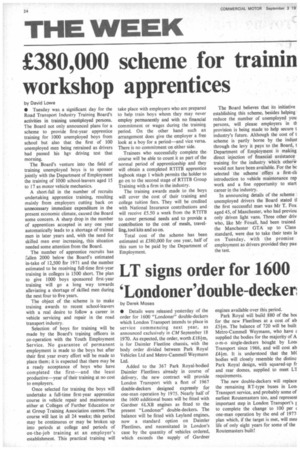£380,000 scheme for trainin workshop apprentices
Page 26

If you've noticed an error in this article please click here to report it so we can fix it.
by David Lowe • Tuesday was a significant day for the Road Transport Industry Training Board's activities in training unemployed persons. The Board not only announced plans for a scheme to provide first-year apprentice training for 1000 unemployed boys from school but also that the first of 100 unemployed men being retrained as drivers had passed his hgv driving test that morning.
The Board's venture into the field of training unemployed boys is to sponsor jointly with the Department of Employment the training of 1000 school-leavers aged 15 to 17 as motor vehicle mechanics.
A short-fall in the number of recruits undertaking apprentice training, resulting mainly from employers cutting back on unnecessary immediate expenditure in the present economic climate, caused the Board some concern. A sharp drop in the number of apprentices accepted in any one year automatically leads to a shortage of trained men in later years and, with the need for skilled men ever increasing, this situation needed some attention from the Board.
The number of apprentice recruits has rallen 2000 below the Board's estimated in-take of 12,500 for 1971 and the number estimated to be receiving full-time first-year training in colleges is 1500 short. The plan to give 1000 boys sponsored first-year training will go a long way towards alleviating a shortage of skilled men during the next four to five years.
The object of the scheme is to make training awards to recent school-leavers with a real desire to follow a career in vehicle servicing and repair in the road transport industry.
Selection of boys for training will be made by the Board's training officers in co-operation with the Youth Employment Service. No guarantee of permanent employment is made to the boys but after their first year every effort will be made to place them; it is expected that there may be a ready acceptance of boys who have completed the first--and the least productive—year of their training at no cost to employers.
Once selected for training the boys will undertake a full-time first-year apprentice course in vehicle repair and maintenance either at Colleges of Further Education or at Group Training Association centres. The course will last in all 24 weeks; this period may be continuous or may be broken up into periods at college and periods of on-the-job training at an employer's establishment. This practical training will take place with employers who are prepared to help train boys whom they may never employ permanently and with no financial commitment or wages during the training period. On the other hand such an arrangement does give the employer a free look at a boy for a period—and vice versa. There is no commitment on either side.
Trainees who successfully complete the course will be able to count it as part of the normal period of apprenticeship and they will obtain a completed RTITB apprentice logbook stage 1 which permits the holder to go on to the second stage of RTITB Group Training with a firm in the industry.
The training awards made to the boys will cover the cost of their training and college tuition fees. They will be credited with National Insurance contributions and will receive £5.50 a week from the RTITB to cover personal needs and to provide a contribution to the cost of meals, travelling, tool kits and so on.
Total cost of the scheme has been estimated at £380,000 for one year, half of this sum to be paid by the Department of Employment The Board believes that its initiative establishing this scheme, besides helping reduce the number of unemployed you: persons, will please employers in th provision is being made to help secure t industry's future. Although the cost of t scheme is partly borne by the indust through the levy it pays to the Board, t Department of Employment is making direct injection of financial assistance training for the industry which otherir would not have been available. For the be selected the scheme offers a first-dr introduction to vehicle maintenance rep work and a fine opportunity to start career in the industry.
In announcing details of the scheme : unemployed drivers the Board stated tl the first successful man was Mr T. Fox. aged 45, of Manchester, who had previou only driven light vans. Three other driv who, like Mr Foxall, had been trained the Manchester GTA up to Class standard, were due to take their tests la on Tuesday, with the promise employment as drivers provided they pas: the test.










































































































































